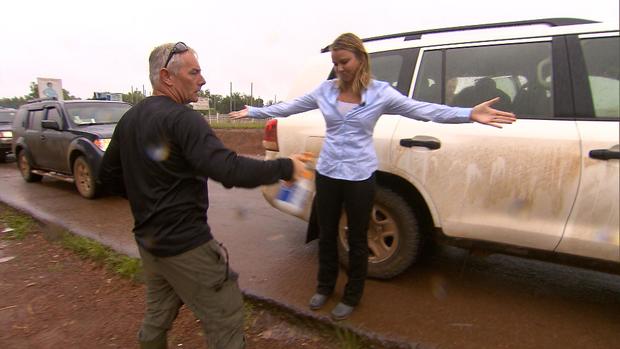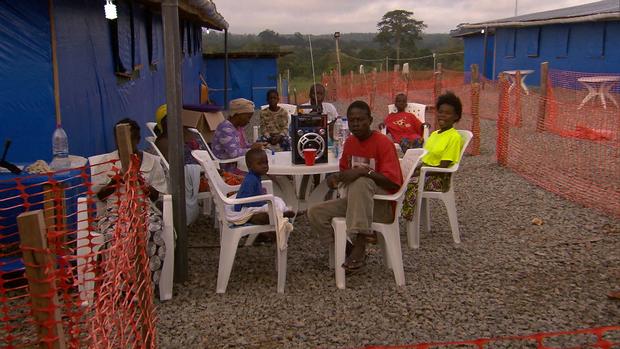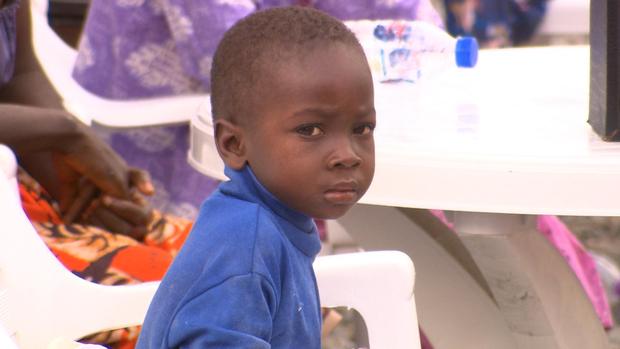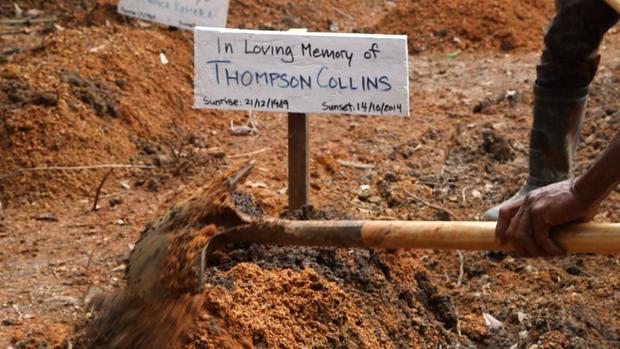The Ebola hot zone
The following is a script of "The Ebola Hot Zone" which aired on Nov. 9, 2014. Lara Logan is the correspondent. Max McClellan, Massimo Mariano and Richard Butler, producers.
No country has been harder hit by Ebola than Liberia, a hot zone for the outbreak, where more people have died from the virus than anywhere else.
That's where most of the U.S. effort is focused, with more than 2,000 Americans now leading the international response and more on the way -- soldiers, doctors, nurses and relief workers -- who're running mobile labs, building hospitals and treating patients.
Liberia lies just north of the equator and is home to part of the last great rainforest in West Africa, where the Ebola virus thrives in tropical, humid conditions.
With their hospitals overwhelmed, special centers for the sick, called Ebola treatment units, are being built as fast as possible. One of them is run by an American relief-group, the International Medical Corps -- where Lara Logan, who is currently self-quarantined for 21 days, reported this story.
To get to the Ebola treatment unit, we traveled north from the Liberian capital along pitted roads toward the border with neighboring Guinea where this outbreak began. American virologist Joseph Fair, who's been here for most of the epidemic, came with us.
Around 40 miles out of Monrovia we were stopped at the first checkpoint.
Lara Logan: So everybody basically crossing this line into the next county has to have their temperature taken?
Joseph Fair: Yes. On the way in and on the way out.
Manned by men with thermometers instead of guns, they were hunting for anyone with a fever.
[Lara Logan: 36.3.]
And after every stop, a ritual cleansing with chlorine. It kills the virus in seconds.
Lara Logan: In this outbreak, there have already been more deaths than all of the previous Ebola outbreaks combined. Why is this one so bad?
Joseph Fair: This really happened at the nexus, the tri-state region where a single or a few tribal groups exist throughout the three countries and each of those areas are connected by roads to the major cities in each of the countries affected. And those major cities are connected to the rest of the world. So this had never happened in such a highly mobile and geographically connected region.
At the end of a dirt road, on the grounds of an old leper colony, we arrived after a five-hour drive at the International Medical Corps' Ebola treatment unit and were hosed down again.
"It's otherworldly. We're in an area football-field-sized plot, cut out of deep green forest, and everything is blue or gravel, and it smells like chlorine. You've come to another planet."
It's a one-disease hospital with 50 beds and a staff of nearly 200, run by American doctor Pranav Shetty, who trained in emergency medicine at UCLA.
Pranav Shetty: We have a lot of protocols and procedures around the cleaning of supplies that are taken in the high-risk zone. This is where we dry boots, basically everything after it's been heavily chlorinated and washed and dried, and clear of Ebola, we can continue to use it.
Since they opened in mid-September, they've treated more than 200 patients and so far, none of their staff have been infected. Containers of chlorine and taps for hand washing mark the divisions between every section. Patients in the confirmed ward have tested positive for Ebola. Those who feel strong enough sit outside, but most are hidden from view in their rooms.
They're separated from the suspected ward by an orange fence, where people whose tests have not come back yet have to wait. No one can enter these areas without layers of protection and on their way out, staff are hosed down in the decontamination zone.
Dr. Colin Bucks: It's otherworldly. We're in an area football-field-sized plot, cut out of deep green forest, and everything is blue or gravel, and it smells like chlorine. You've come to another planet.
Dr. Colin Bucks has been on duty here for the past month. At home, he's an emergency physician at Stanford.
Dr. Colin Bucks: The world, if it chooses and people say "step up," I think this is very containable.
Lara Logan: And if they don't?
Dr. Colin Bucks: I think we make our own bed, you know? That's why I urge people to say, "This is my responsibility. I have a global citizen's responsibility to do this." And if you want to say a patriotic responsibility to keep America safe. "Yeah. People go off to war to keep us safe; people should fight this crisis with the same sense of responsibility."
[Kelly Suter: These rooms are clean.]
Nurse Kelly Suter is one of a handful of Americans working alongside Colin Bucks
Kelly Suter: Even though I know it's a reality that I could get sick, and that I could be one of them that doesn't survive, I'm OK with that because I'd rather be here helping than home and safe.
"So I got down by his bed and held his hand and talked to him. And a few minutes later, he was gone."
She's 29, from northern Michigan and will be here until the end of the year.
Lara Logan: What is it like to see it every day?
Kelly Suter: It can be difficult. There's good days and there's bad days. I mean, the first deathbed I experienced was a gentleman that, I mean, he came in critical but I didn't expect him to pass away as suddenly as he did. In fact, I was in there bathing him and getting him dressed and then all of a sudden I looked up and his eyes were really big and he was obviously scared. And, you know, my instincts as an American nurse is to turn around and look for, you know, the code blue button to hit or some medications or an Ambu bag. And you realize that...
Lara Logan: But there isn't one?
Kelly Suter: No, you know. So I got down by his bed and held his hand and talked to him. And a few minutes later, he was gone.
Most of the staff here are Liberian and to lift their spirits they mark every new shift with hymns. The stigma of the disease is so great, many of them say they're treated as outcasts when they commute back home every day. But in here, the Americans who work with them call them heroes.
In sweltering heat and often 100 percent humidity, they cover every inch of their bodies in plastic and rubber armor. They're so hard to recognize, they wear their names on their foreheads. It's for each other and for their patients.
"Oh, I can't even imagine what they experience in the first 24 hours when all they see are these, you know, faceless creatures that are moving around."
Lara Logan: How tough is it to wear that suit?
Dr. Colin Bucks: Physically?
Lara Logan: Yeah.
Dr. Colin Bucks: It's astounding. You're soaked with sweat before you walk in. You're just drenched. The tough part is that when the masks get filled with your own breath and sweat, that then it really gets hard to breathe. And you have to go to breathe. You have to get out then. It actually, you feel like you're suffocating.
Every time they cross into the high-risk area, they're touching people at their sickest and most contagious. That's Dr. Steven Hatch, an infectious disease specialist from Massachusetts, on his two-hour shift behind the fence.
Dr. Steven Hatch: I try to make it seem like I'm a regular guy doing a regular piece of work. It removes that sense that I'm an alien, which is the first reaction the patients have when they see us.
Lara Logan: It's kind of intimidating, right?
Dr. Steven Hatch: Oh, I can't even imagine what they experience in the first 24 hours when all they see are these, you know, faceless creatures that are moving around. And so I try to do everything I can to humanize that process for them and we all do around here.
In the confirmed ward, patients wait mostly to die. There are 15 to 20 here at any given time. A few survive with IV fluids and early care that allows their immune systems to get ahead of the virus. But if they don't, it wreaks havoc on their organs, melting away cell walls and plunging the body into shock. It can be an agonizing death, which the doctors here try to ease with pain medication and sedatives.
Lara Logan: So this area behind me is the high-risk area here at the treatment center. And we want to talk to some of the patients, but you have to keep your distance. And this gentleman who you can see behind me, is caring for his son. He was cured here at the center. And is now looking after his five-year-old boy who is confirmed to have Ebola.
The boy's name is William. And his father, George who is now immune to this virus, gave us permission to tell their story. Nurse Kelly Suter was with them from the start.
Kelly Suter: He's been by that little boy's bedside around the clock, And when things get hard or I'm tired or sweating so bad that I just want to go home, you know, I remember George and I remember little William.
Lara Logan: So what would you want people at home to know about this?
Kelly Suter: It's not as scary as it seems because it is manageable. There are protocols, there are procedures to protect yourself. It's not like we're walking into Ebola land and, you know, we're all going to die. We're doing what we should. We know what we're doing.
A medical team masked in full protective gear is always on hand when new patients are brought in. This is what passes for an ambulance here: a pick-up wrapped in orange tarp.
On this day, Colin Bucks was waiting. No one can come near the patient until the sprayers are done.
Strapped inside, a young man highly infectious with Ebola. He'd been abandoned on the street for a week until they picked him up.
"We were just a few days from declaring it over and that's when we had cases emerge both in Liberia and Sierra Leone and Guinea."
Dr. Colin Bucks: They were afraid that he would exit the vehicle while it was moving. He was quite confused. And we see that with Ebola, a kind-of encephalopathic kind of state.
The trauma of the epidemic had touched everyone we met.
Over the summer, virologist Joseph Fair saw some of his closest friends in this region, doctors and nurses he'd known for years, get infected and die. Fair has spent 15 years in West Africa, mostly on behalf of the U.S. Department of Defense, studying dangerous viruses in secure labs or trying to track them down at their source in the animal world.
For most of the past eight months, he's been working to get ahead of this epidemic. Here at the National Laboratory in Liberia, there was no way to test for Ebola until he and his team hand-carried in the equipment. By late May, they thought the outbreak was over.
Joseph Fair: We were just a few days from declaring it over and that's when we had cases emerge both in Liberia and Sierra Leone and Guinea.
Lara Logan: What happened?
Joseph Fair: Individuals that were infected with Ebola were missed at the time through the contact tracing that was in place. And those individuals traveled, became ill and infected other individuals around them.
Lara Logan: And that is the cause of this current huge wave of the epidemic?
Joseph Fair: That's all it takes. It only takes missing one individual to result in another outbreak.
Resources that were slow to come at first are now pouring in. The U.S. Army showed us one of the 17 Ebola treatment units they are building together with the Liberian military.
But there's still no cure and the virus is killing around 70 percent of the people it infects.
Tracking down the sick and the dying is a dangerous but critical part of containing the outbreak. On this day, the International Medical Corps' ambulance team, led by Dr. Trish Henwood from the University of Pennsylvania and Kenyan nurse Elvis Ogweno, had been called back to a house where two people had already died of Ebola.
The patient was kept isolated to one side, while a team of sprayers worked on the house with chlorine.
As he walked to the ambulance, the patient was followed. They covered every piece of ground he touched.
He was headed for the suspected ward, where patients are caged in waiting to find out if they have Ebola.
"...Until we handle outbreaks where they occur, we are never going to be safe ourselves."
Like this woman, who stayed close to her son. Her husband already lay deathly ill on the other side of the fence in the confirmed ward. Later in the day, anguished wails filled the air. She had just been told her husband was dead.
Death is a constant here, and at the end of a path through the forest, lies their graveyard. A team of gravediggers try to stay ahead of the numbers. For the American scientist, they had many questions.
[Joseph Fair: We think it probably exists in the bats because they don't get sick from the virus and that's how we know usually where the virus comes from. If it doesn't make that animal sick, it usually means that animal can carry the virus]
Lara Logan: What do you say to people back home who are much more focused on Ebola in the U.S. and think, you know, you should just shut it off, isolate it and protect Americans from this disease?
Joseph Fair: The thing that I need to get across to everyone is that until we handle the outbreak here -- and be that Ebola, be that some other disease -- until we handle outbreaks where they occur, we are never going to be safe ourselves.
There were 34 filled graves when we arrived. Two and a half weeks later there were more than 60. The patient, who came strapped inside the ambulance, is now lying here.
For every death, a simple funeral. A patient's brother clutched a wooden gravemarker on his way to the graveyard. The body, still infectious, had to be wrapped in two body bags. With each move, there was more chlorine. It's now protocol here for every burial.
For the boy William and his father George, who survived Ebola with the help of the American doctors and nurses here, there was much hope as they fought for his son's life. But in that same graveyard a few days later, another small grave was added.




